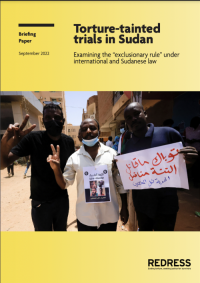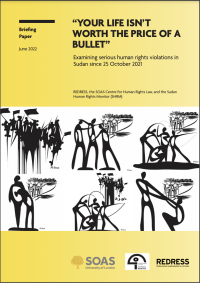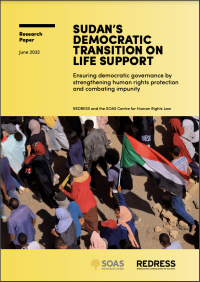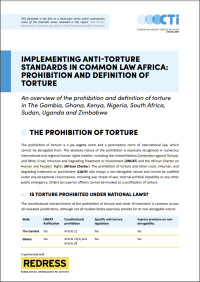Publications
REDRESS’ publications are also available in hard copy format. Please contact us for further information on [email protected].
REDRESS and the Centre for the Development of People (CEDEP) made this submission to draw the Committee against Torture’s attention to the issue of discriminatory violence affecting individuals identifying or perceived as LGBTIQ+ in Malawi. This submission is based on our extensive experience working against torture and on LGBTIQ+ issues in Malawi.
This briefing highlights the urgent need for legal reforms in Sudan prohibiting the use of information tainted by torture in any judicial proceedings, as required by article 15 of the Convention against Torture. The briefing also shows that many cases move through Sudanese courts in which allegations of torture have been raised by defendants, including in ongoing proceedings against four men accused of killing a police brigadier general during protests that took place in January 2022.
This briefing paper, jointly prepared by REDRESS, the Sudan Human Rights Monitor (SHRM), and the SOAS Centre for Human Rights Law, is based on 35 interviews conducted by SHRM in Khartoum, Sudan, and provides first-hand evidence of the nature and consequences of ongoing human rights violations for direct and indirect victims and the wider community.
The findings document what has become a centrally planned and systematically implemented assault on the young and the future of Sudan. It has already taken an immense physical and psychological toll on the immediate victims, their friends, families, and whole communities. Notably, some of them have lodged complaints and pursued legal remedies. However, the lack of responsiveness of the authorities, and indeed ongoing commission of serious violations, demonstrates the complete lack of justice and accountability in Sudan.
This research paper from REDRESS and the SOAS Centre for Human Rights Law situates Sudan’s current political and human rights crisis within the broader historical context, demonstrating that the cyclical nature of Sudan’s post-independence, post-coup politics is closely linked to the absence of respect for the rule of law, human rights protections, and justice for past violations.
In a letter ahead of the Council’s 50th session (13 June to 8 July 2022), REDRESS joined other non-governmental organisations in calling on the UN Human Rights Council to support the adoption of a resolution that ensures continued attention to Sudan’s human rights situation through enhanced interactive dialogues at the Council’s 52nd and 53rd regular sessions.
This report summary highlights the key findings and recommendations of our report Unequal Justice: Accountability for Torture against LGBTIQ+ Persons in Africa. The report sheds light on the violence and torture suffered by LGBTIQ+ people in Africa and the challenges that victims face to secure accountability for these crimes. It examines the situation in 11 countries in Africa - Algeria, Angola, Botswana, the Democratic Republic of the Congo, Ghana, Kenya, Malawi, Morocco, Mozambique, Uganda, and South Africa - but the findings of the research are equally applicable to other contexts in Africa. The report outlines specific proposals to States, African human rights bodies, and civil society to improve the current situation.
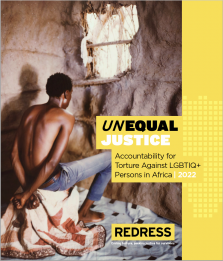
This report sheds light on the violence and torture suffered by LGBTIQ+ people in Africa and the challenges that victims face to secure accountability for these crimes. It examines the situation in 11 countries in Africa - Algeria, Angola, Botswana, the Democratic Republic of the Congo, Ghana, Kenya, Malawi, Morocco, Mozambique, Uganda, and South Africa - but the findings of the research are equally applicable to other contexts in Africa.
While discriminatory violence can and often does amount to torture or other ill-treatment, the report finds that States often fail to confront or treat it as such. Many States in Africa afford little to no legal protection to LGBTIQ+ persons, whilst others criminalise same-sex conduct and fail to recognise the full spectrum of sexual orientations and gender identities. In recent years, there has also been a resurgence in legislation which targets, rather than protects, LGBTIQ+ persons. This has resulted in an increase in violence against LGBTIQ+ persons, while impunity remains the norm.
The report, which has a foreword by the UN Independent Expert on sexual orientation and gender identity, Víctor Madrigal-Borloz, outlines specific proposals to States, African human rights bodies, and civil society to improve the current situation.
The Convention against Torture Initiative (CTI) and REDRESS three-part series of factsheets summarises the key thematic areas reviewed in the recent report titled ‘Anti-Torture Standards in Common Law Africa: Good Practices and Way Forward’.
The factsheets review the anti-torture legal and regulatory frameworks in specific States in common law Africa but can be useful for other States and practitioners in the region more broadly. Specifically, the three factsheets analyse:
The extent to which the reviewed States have domesticated the definition and prohibition of torture, the implementation of safeguards against torture for persons deprived of their liberty, and the existing complaints and investigation mechanisms that receive complaints of and investigate allegations of torture and other ill-treatment in the eight States reviewed.
To download a Factsheet, see the ‘Downloads’ menu and click on the Factsheet you would like to download.

